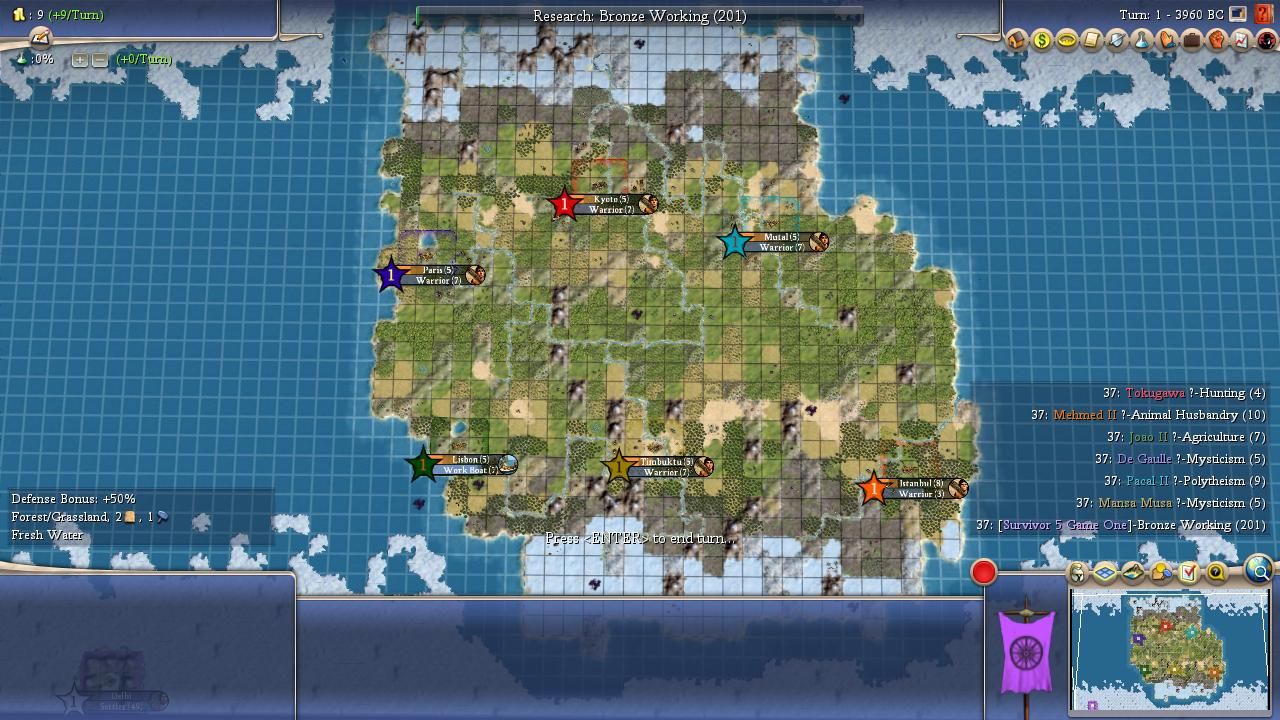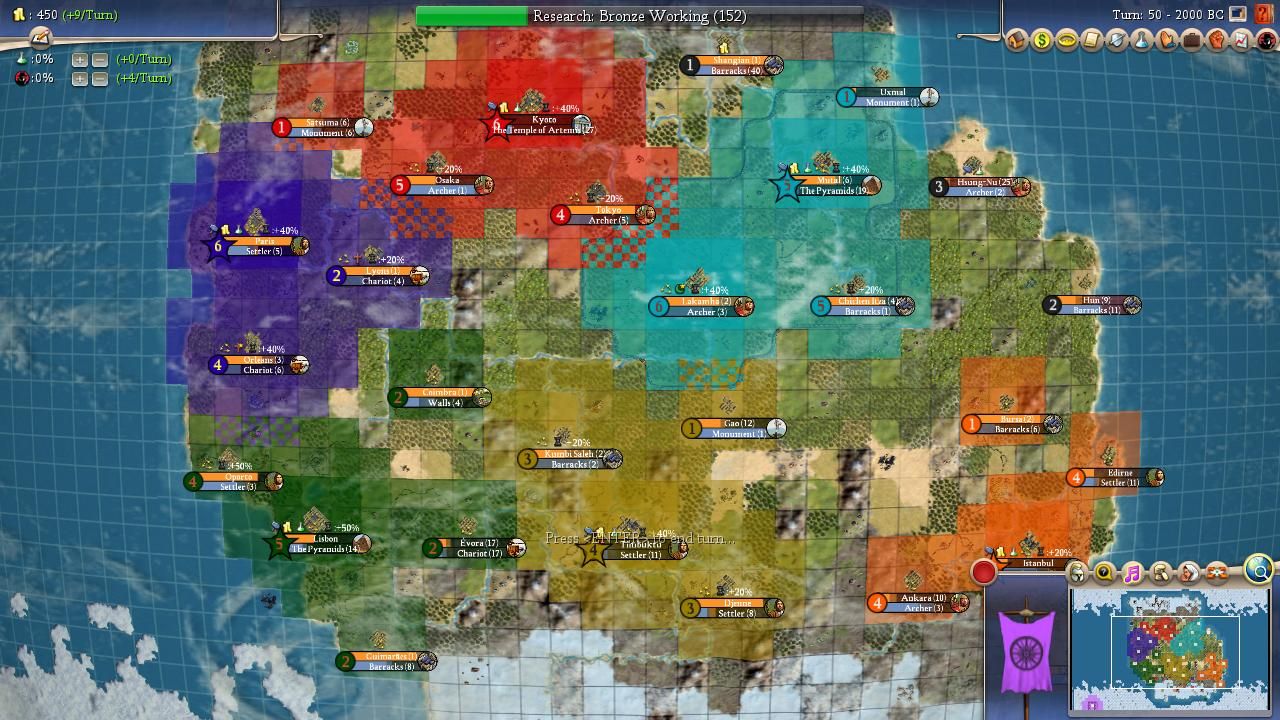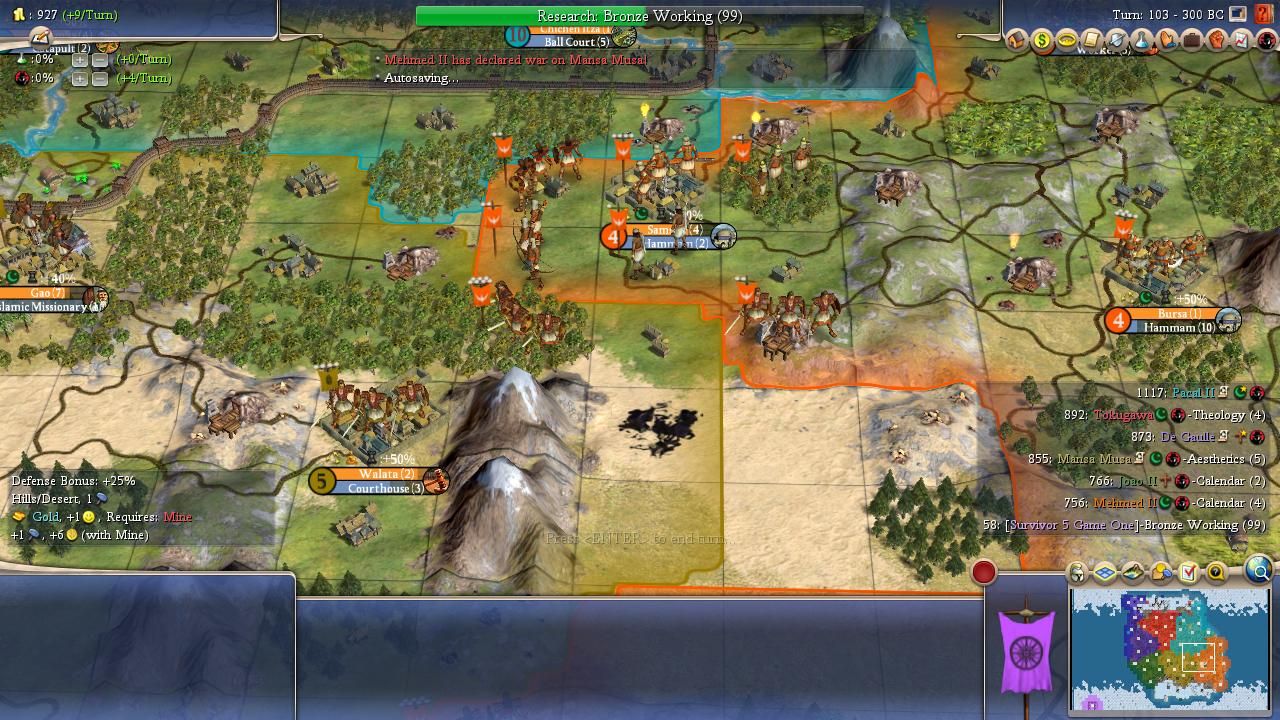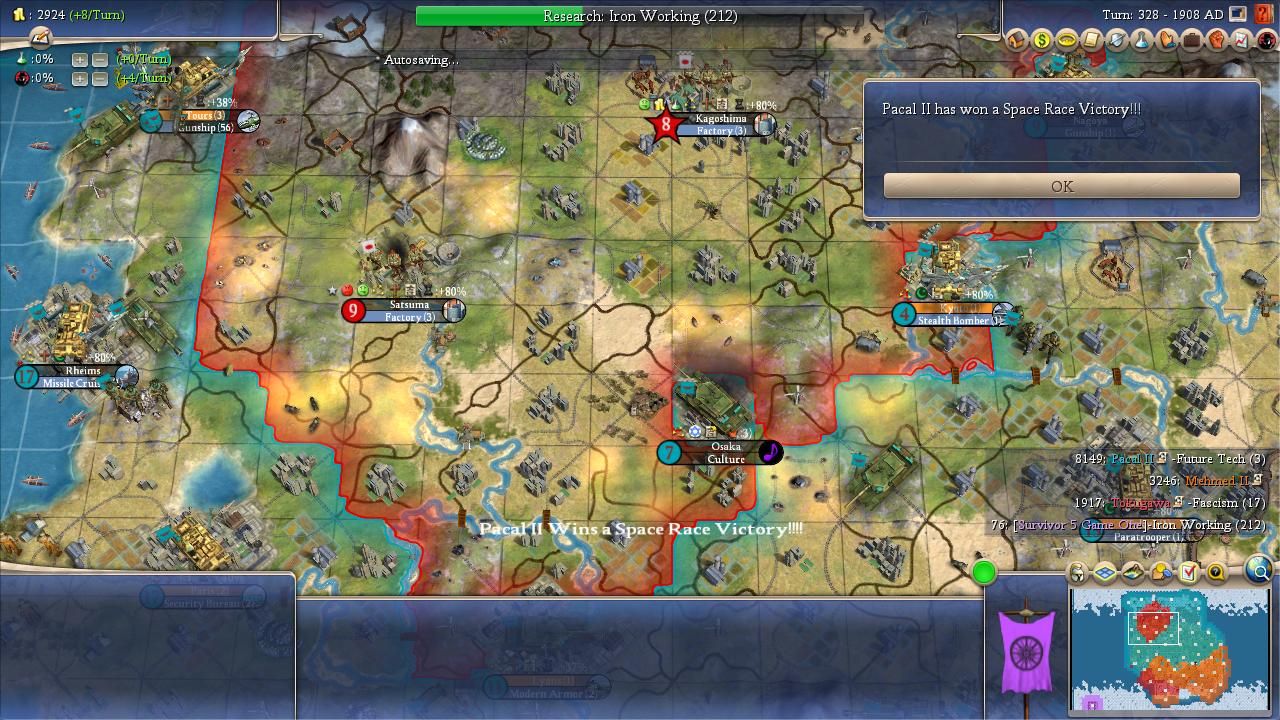


For our first game of Season Five, we had a typical mixed group of AI leaders duking it out for supremacy. Mansa Musa and Pacal were expected to bring their economic might to the competition and do their best to out-research everyone else. Mansa needed to get out to a good start in this field of mostly low peace weight AI leaders to snowball ahead with his research prowess. Joao managed to roll a coastal start and looked to have a good setup for his traits. De Gaulle would likely compete with Pacal to see who can build the most wonders, while Mehmed searched for someone to conquer with his armies. Finally, Tokugawa found himself in the middle of the map and was not pleased to have everyone else tramping around his territory. Civ4's version of the angry old man telling everyone to stay off his lawn was facing some tough competition here.

Pacal was the only leader in this group to start with Mysticism tech and he predictably founded one of the early religions (Islam) in his second city on Turn 10. What we did not expect was the location of Pacal's second city, as the holy city of Lakamha was planted southwest of the Mayan starting position in the center of the map, where its free culture quickly ballooned out in every direction. This settling decision immediately cut off Tokugawa's access to the central jungles and helped out Pacal significantly during the landgrab phase. The general expectation had been that Mansa Musa would likely found the other early religion due to his cultural research emphasis. However, Mansa decided to ignore religion in this game and it was instead De Gaulle who grabbed the second religion (Christianity) at the late date of Turn 32. Pacal picked up the Monotheism religion a little bit later and buried it, thus leaving the world with only two competing religions of consequence. Christianity would spread south into Portugal while Islam became dominant everywhere else, helped along by a flood of missionaries from Pacal. This religious diplomacy would end up shaping much of what took place in the game.
In terms of expansion, Joao put his Expansive/Imperialistic traits to good use by being the fastest leader to six cities. Despite the presence of the Christian holy city direction to his north, Joao managed to secure a bit more territory than expected, including poaching the contested spot on the border with Mansa Musa just a few turns before the Malinese settler was due to arrive. This would significantly weaken Mansa's development, denying him a strong riverside spot that he seemed likely to claim. Up to the north, Tokugawa had been cut off in pushing towards the center by Pacal's early holy city and therefore he opted to expand to the west instead, squeezing De Gaulle and nearly stealing away the only copper resource available to France. De Gaulle had been building Stonehenge instead of expanding and it looked as though he would be cut off, stuck on a mere three cities:

Instead, De Gaulle would sneak out a series of settlers through the narrow open corridor running along the western coast. He was ultimately able to grab copper up there and follow the initial city with several additional ones in the extreme north, icy fishing villages that were pretty decent contributors thanks to having seafood resources on hand. This kept De Gaulle from being a helpless metal-less leader who had no chance to survive. Meanwhile, the push of so many leaders to settle westwards had left additional open territory off to the east. Several barbarian cities sprang up there without doing too much to slow down the AI leaders, largely because the barb settlements failed to appear on hill tiles and could be captured much more easily. The winners of this development were Pacal and Mehmed, both of whom were able to expand into unclaimed territory long after the other leaders were out of space. Mehmed in particular had a slow start but took advantage of the extra land, eventually capturing the barb city of Hun and racing out to eight cities in total. Pacal grabbed the other two barbarian cities to pair along with his strong economy. Even losing out on a Pyramids race to Joao by a single turn didn't seem to be hurting the Mayans too badly.
By the time that the landgrab phase came to a close, it was clear that Pacal had emerged as the early favorite. There was a clear separation between Pacal and the rest of the leaders on the scoreboard, he was tied with Mehmed for the most cities and the most territory, and the Mayan leader was unquestionably at the top of the group when it came to research. Mansa Musa was also starting to accelerate his own economy with the familiar mass cottage cheese, however he'd been unable to expand past five cities and that was hurting Mali quite a bit. Mansa was also the "worst enemy" of most of the other low peace weight leaders and he badly needed to avoid an early war. What Mansa most needed was time for his economy to ramp up and push him to the next generation of military tech before an invasion arrived. He had a real chance to dodge that bullet too, thanks to adopting the same Islamic religion as Pacal and Mehmed and Tokugawa. With enough shared faith bonuses, perhaps Tokugawa and Mehmed would race off to fight a crusade against the Christians in the west instead.

Or maybe not. Unfortunately for Mansa Musa, shared faith bonuses proved unable to overcome the massive difference in peace weight between his civ and the Ottomans. This was the single most important moment in the game, the initial domino falling over and setting in motion all of the subsequent events. I immediately mentioned on the Livestream that this likely sealed Pacal as the game's winner and Mansa Musa as the First to Die, as Mansa seemed certain to be subject to a dogpile of the other low peace weight leaders, leaving Pacal to run away with the game via his culture and research. Perhaps Mansa would be able to stalemate this war against Mehmed but even in a best case scenario it would knock him out of contention for the win. And with Mehmed having eight cities compared to Mansa's five, the production edge was heavily in favor of the Ottomans. Although Mansa built Chichen Itza to slow down the pace of conquest, there wasn't a lot that he could do once catapults appeared on the scene and started knocking down city defenses. Just too much production edge and too many units on the side of Mehmed.
The AI leaders are very good at sniffing weakness in Civ4 and a dogpile against Mansa Musa was the most likely outcome at this point. Instead, we had one of those baffling war declaration sequences when Tokugawa decided to attack his fellow Islamic compatriot Pacal rather than invading the Christians in the west or high peace weight Mansa to the south. Pacal was caught completely off guard by this attack, losing two cities to Tokugawa despite being ahead in technology, before eventually fighting to a stalemate and getting one of those two cities back in a peace treaty. The net effect of this war was knocking Pacal back towards the rest of the pack a bit; he was still ahead but not a complete runaway as had previously seemed likely to develop into. Then more war declarations started piling on: first De Gaulle invaded Mansa Musa, then Pacal attacked De Gaulle, followed by Tokugawa also invading France:

This was a case of the strong getting stronger at the expense of the weak. Mansa had been stalling out his war with Mehmed thanks to his city defenses but he certainly couldn't afford to deal with another AI invasion from the opposite direction. Then De Gaulle quickly found himself on the wrong end of a 2 vs 1 situation, with Pacal somewhat inexplicably marching across the world to attack him along with the Japanese a few turns later. De Gaulle's army was caught out of position in Malinese territory and attempted to beat a hasty retreat. It was already too late, however, and the non-tundra core of France fell rapidly to the combined invaders. We now had a race as far as who would be first eliminated from the game, Mansa Musa or De Gaulle, and the scales were tipped by an unexpected source: Joao, the game's forgotten man, decided that he would attack Mansa Musa. Yes, the two high peace weight leaders fighting amongst one another, a disastrous outcome for anyone who backed Mansa Musa in this game. Mali had been in a state of collapse for some time and the intervention of the Portuguese effectively broke the remaining resistance. Two of Mansa's three remaining cities fell simultaneously on Turn 157 and the capital followed shortly thereafter on Turn 166:

For Mansa Musa, the story of this game was a failure to get his economy going. His expansion was just slightly too weak, a couple turns too slow to secure the Evora location to his west and additional territory to his north. Had Pacal's Islamic holy city popped up in a different location, Mansa might very well have found himself on seven cities and been strong enough to counter-invade Mehmed in his own conquest. Given another 25 turns to develop in peace he also might have managed it. Regardless though, Mansa Musa failed to get going in this game and ended up as the first casualty of Season Five. He didn't have much longer to wait until De Gaulle joined him, with the relentless march of the Mayan and Japanese armies steadily rolling through what remained of French territory. Pacal took all of the cities along the western coast and Tokugawa delivered the finishing blow on Turn 177.

At this point there were four leaders remaining, and aside from Pacal's edge in technology, all four of the competitors appeared to be fairly even. Joao even landed the Liberalism prize and took Astronomy with the free tech which superficially made him appear to be in a good position. However, it was obvious that Joao was a dead man walking due to the diplomatic situation lurking in the background. Joao was the only leader practicing Christianity in a world where the other leaders were joined in Islamic unity, and he was also the only high peace weight leader sharing a continent with three low peace weight leaders. This manifested itself in three "Annoyed" faces staring at Joao and it was only a matter of time until the next round of warring began. Mehmed invaded on Turn 191 followed by Tokugawa on Turn 193 and that was the beginning of the end for Portugal. The two of them carved their way through the green borders of Joao without much in the way of resistance. Tokugawa ended up being the more efficient conquerer despite being behind in technology, and he wound up with five cities compared to two for the Ottomans, including snagging the killing blow at the conclusion:

Tokugawa and Mehmed therefore ended up almost exactly balanced against one another in terms of score, when a slightly better performance from Mehmed would have had him comfortably ahead. The Ottomans were half a dozen techs ahead of the Japanese but this was matched by Tokugawa gaining more territory from the demise of Portugal. The real winner from this conflict was Pacal, however, who had taken advantage of the time that the other two leaders spent warring to surge far out ahead in technology. There was a period of vulnerability for the Mayans when Pacal delayed Rifling tech for quite some time, as he went down the Scientific Method line to claim the free Great People at Physics and Communism. Mehmed went straight for the military technologies, and had he launched an invasion of Pacal at the right moment, he might have been able to take down the Mayans. Instead Mehmed and Tokugawa were off smashing Joao, and by the time that they had finished and were ready for another round of fighting, Pacal had made his way not just to Rifling tech but the cusp of finishing Assembly Line research. The moment of potential weakness was gone and it was already too late. Pacal would be a full generation of military tech ahead of anyone else for the remainder of the game.
Thus it was a monumentally unwise decision by Tokugawa to launch an attack against Pacal on Turn 237 when Pacal was two turns away from finishing Assembly Line research. The Japanese army was still three techs away from Rifling, full of longbows and elephants and knights going up against a Mayan force which was just about to unlock infantry along with factory production output. This was pretty much the film The Last Samurai in action, with brave Japanese warriors falling en masse to the industrialized power of the Mayans. Pacal quickly began rolling his way through the Japanese border cities while producing an impressive shark fin on the Power bar graphs. The war could have easily continued onwards to an elimination of Tokugawa and a potential Domination victory by Pacal if it hadn't been interrupted by a peace treaty a short time later:

This was Pacal's generally peaceful nature undercutting his own best interests. Some leaders are much more likely to sign peace treaties than others and Pacal doesn't have the same kind of killer instinct as compared to some of his rivals. In any case though, we were in for a long period of peaceful building afterwards. Mehmed and Tokugawa were "Friendly" with one another and Pacal didn't seem interested in beginning another conquest. Instead the Mayans focused on tearing through the remainder of the tech tree, accelerating more than an era ahead of the other two leaders en route to a likely Spaceship finish. It wasn't the most efficient pathing through the tech tree from Pacal, as he researched Fusion tech before unlocking research labs at Superconductor. He also wasted time grabbing the optional military techs at the top of the tree that the AI seems to love so much. Ultimately it didn't matter too much though since Pacal was so far ahead, only delaying a potential finishing date slightly for the purposes of the picking contest.
Sometimes the AI leaders seem to get frisky once they've hit the end of the tech tree and that ended up happening again here:

This has happened in too many games to be a pure coincidence, something about finishing the necessary spaceship research seems to flip some kind of aggression switch in their programming. Anyway, Pacal finally decided to get some payback for the two times that Tokugawa had invaded by launching his own attack against the hapless Japanese. This was a one-sided war of modern armor and mechs against defending rifles, always a horrific slaughter, and Pacal wasn't shy about raining down nuclear strikes against his western neighbor either. Tokugawa almost certainly would have been eliminated here except that Mehmed joined the war on his side on the very next turn, the Japanese/Ottoman game-long alliance manifesting itself one final time. Mehmed was a good ways short of finishing the tech tree but did have his own infantry and factories to make the conflict a somewhat more even playing field. He also sent an invasion force with 135 units (mostly rifles and cavalry) into Mayan territory, and it took Pacal almost a dozen turns to clean that out. By the time that Pacal was ready to move onto the offensive again, the Mayan spaceship had arrived at Alpha Centauri and the game was over:

Thus the main significance of Mehmed's intervention was to send Tokugawa into the Wildcard game. (That and ticking the war declaration counter from 10 up to 11, disappointing all of us who had predicted an even ten wars!) Pacal was likely about a dozen turns away from triggering a Domination victory instead, and he would have gotten a lot closer if he finished off the huge pocket of Japanese culture clinging to life in the north. Pacal looked like a complete runaway performer according to the scoreboard, and he was a runaway indeed when it came to technological research. He had not been nearly so far ahead just two dozen turns earlier though before capturing most of Japan and all of the Ottoman border cities. Pacal's strong position had been masked for most of the game before exploding into action (quite literally) during the closing turns of the game.
Overall, this was a game that was decided pretty early on. Once Mehmed made the fateful decision to attack Mansa Musa, the rest of the events followed in largely predictable fashion. Mansa wasn't able to expand fast enough and get his economy rolling before the low peace weight leaders started hounding for his blood. De Gaulle and Joao were victims of practicing an unpopular religion, eliminated one by one in the middle stages of the game. Tokugawa did well when he picked the right targets for his invasions and not so well when his aggression was poorly directed, while Mehmed played a game that was just about perfect for him in running over the weak targets while staying away from the dangerous ones. As for the winner, Pacal rode an effective landgrab with a well situated early holy city into a position of economic dominance, and without Mansa Musa as a research competitor, faced little danger for the rest of the game. He actually underperformed to some extent, believe it or not: without the early Tokugawa attack where he lost two cities, Pacal would have been a complete runaway. Or Pacal could have continued his second war with Tokugawa without signing a peace treaty, which would have been an easy conquest and left him at something like 55% land area while more than an era ahead in tech. This was an impressive win while still leaving a lot on the table. We'll see how Pacal and Mehmed fare in their playoff games - thanks as always for watching and reading along.



